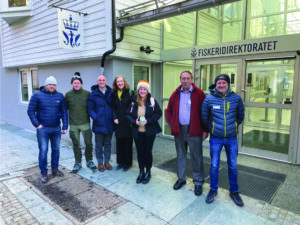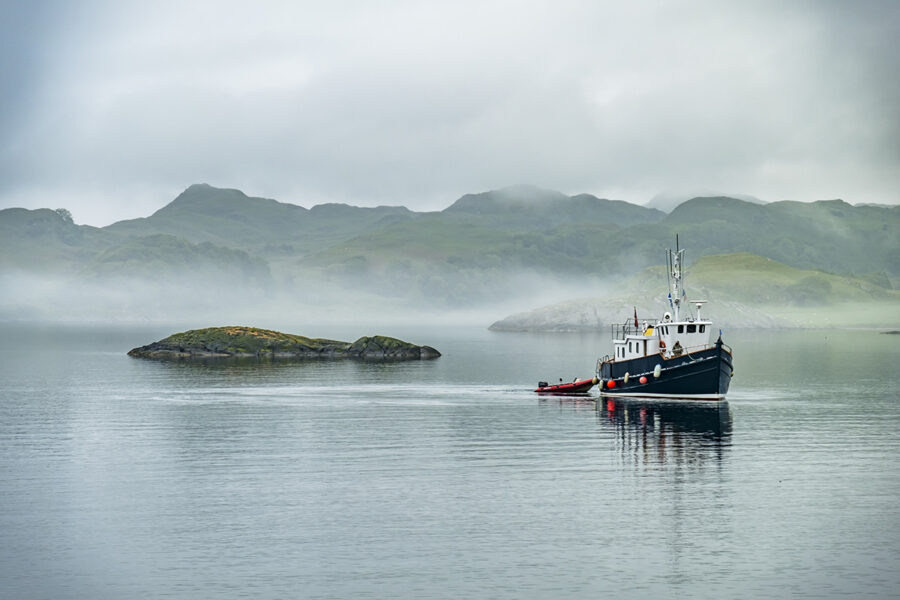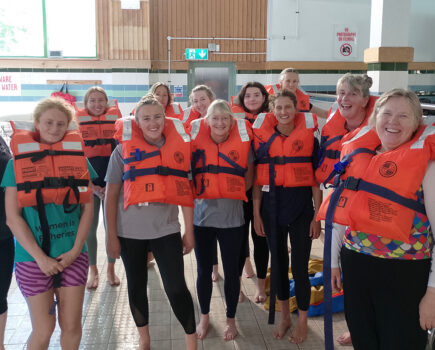A busy Fishing into the Future (FITF) event recently on the subject of ‘Fishing to Net Zero’ saw a wide range of speakers at the forefront of industry scope out the way ahead for the industry on this front – which is still very much in its infancy.
A common theme across speakers, echoing many others’ experiences, is that technology is progressing faster than government and regulators’ ability to manage and cope with this in the fishing sector. Several of the speakers mentioned hull design, where the transition to new zero- emission fuels is likely to require longer, more efficient hulls, that under the current regime will fall foul of licensing rules.
Kara Brydson of Fisheries Innovation and Sustainability (FIS), a cross-industry group involving catchers, processors and retailers, pointed out that it was vital that the fishing industry took control of the direction of any moves towards net zero, and leads the debate, rather than waiting and having to react to rules or targets developed by those outside the industry. This was the guiding ethos behind the Vessels of the Future work that FIS has been part of.
“FIS is here to help leverage investment, and this includes retailers and processors who want to support practical innovation in the catching sector,” she told the meeting. “Many retailers are committing to only stocking net-zero products by 2040, and this will include seafoods.
“‘What fresh hell is this?’ is one response I have heard from industry, when I started talking about a new initiative about net zero. But it is so important that we take control of the direction of change, and make it practical and industry-led.
“We are already being asked to show how we will reduce our reliance on fossil fuels, but this is not just about pleasing buyers, it’s about reducing costs, reducing footprints, and providing our own inputs to fight what many are now calling a climate emergency.
“The Vessels of the Future initiative FIS is supporting is not just about building a boat! This needs harbour infrastructure, supply chains, funding packages, policies, government support, buyer support, that all is needed to support the fishing industry in transition. Early adopters shouldn’t have to do this on their own.”

The Northern Ireland team that visited Norway to look at zero-emission options for the fishing industry saw lots of work, but no realistic solutions in the near future for many sectors of the Northern Irish fleet. However, the FITF event heard about the design of a 12m zero-emission vessel that is hoped will be built in Northern Ireland as a demonstration vessel.
FIS helped to host the Vessels of the Future workshop in May 2022, where Duncan Boag of Macduff Ship Design, one of the many speakers at that workshop, agreed to work on what the vessels of the future may require – not just the technology, but the engineering skills, support and training.
“If we don’t do this work, we won’t know costs, the gaps, the consenting process, the approvals needed from different regulators,” he told the FITF event. “We first looked at the different fuels – their advantages and disadvantages, and then at three designs of vessel: a 10m potter, a 15m prawn trawler and a 24m whitefish boat.
“For the larger vessels, several fuels necessitated an increase in length and tonnage of 20% or 30% to cope with the requirements of the fuels, and the vessel design we costed up came out at about 45% more expensive than a conventional build, with likely a premium for being an early adopter.”
Of the options available, he suggested, a hybrid solution, with electric engines for larger potters, offered the most realistic and cost-effective option.
Elaine Whyte, one of the team from the Clyde Fishermen’s Trust who helped to develop the original workshop, confirmed how important it was that, for a change, this is an initiative led by the industry, when for so many issues, it is outsiders imposing agendas or ideas on fishermen.
“‘What fresh hell’ is also exactly the initial reaction of many Clyde fishermen,” she said, but after the initial workshop, there was optimism that this could actually be an opportunity for a revitalised industry, with a future for new entrants.
“This is something positive for young people to get involved in – a career path that will last, with transferrable skills. It can inform our own plans for infrastructure needs as an industry as well, when we have mapped out some of the investments needed.”
Ronnie McBridge of Daera in Northern Ireland talked about the lessons learned from a joint industry/government trip to learn more about the progress of the Norwegian industry in moving to net zero.
The news, he suggested, wasn’t unbridled optimism. “There are no net-zero solutions confirmed yet for larger vessels. We did learn a lot from one hub of companies, a deliberate cluster of different expertise on every type of hydrogen issue, from production to transport to engine design. A second similar hub was looking at similar issues.
“For the vessels they are looking at, larger ones, their thoughts were electric vessels, backed up by hydrogen power, but they are not yet able to confirm this.”
NFFO CEO Mike Cohen provided a brief overview of the work that the federation is part of, to maximise the benefits of the multiple strands of work that the industry is undertaking. “We as an industry are so often talked at, not listened to – on the net-zero issue, we can lead the way. “We’ve set up, across the industry, the Vessels into the Future forum, to bring as much existing knowledge together as possible. There will be groups looking at propulsion systems, harbour infrastructure needs, fuel needs – but we also need to look at technologies that reduce existing fuel use. It is not all about replacing diesel, but reducing it.
“A key issue is to manage expectations both within the industry but also of those outside it, who will otherwise possibly impose unreachable requirements on us as an industry.”
Two speakers for the MCA emphasised the progress made from a standing start, which they said was an important learning curve for everyone involved. “We do need to hear what people are planning, and our advice to anyone intending to convert to net zero or try the new technologies is to contact your marine office as soon as you can, to discuss your plans.
“MGN 644 can help understand the various steps needed, but the key is to talk to us. We are learning as much as you are on these issues.”
FITF executive director Emma Plotnek told FN after the meeting: “We were really pleased with the turnout and the number of speakers. We aim to inform and connect, but it’s clear that there is a much greater need to convene and get people talking about the practicalities of moving to net- zero across the industry. “We were very ambitious with our speakers, who brought such a huge range of information. It is clear that across industry, people are leading on this in all sorts of ways, and are very much ahead of many of the regulators, who we need to have onboard as discussion develops on new licensing rules, new safety rules and build standards.
“FITF will do its best to help create inclusive spaces to enable this debate.”
Fishing News hopes to look in more detail at some of the issues raised, and the contributions of other speakers at the event, in future issues. The full recording of the presentations is available here.
This story was taken from the latest issue of Fishing News. For more up-to-date and in-depth reports on the UK and Irish commercial fishing sector, subscribe to Fishing News here or buy the latest single issue for just £3.30 here.
Sign up to Fishing News’ FREE e-newsletter here.








